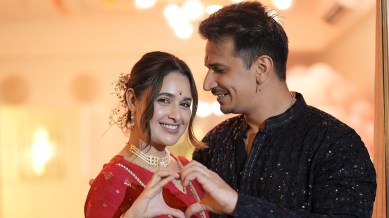📣 For more lifestyle news, click here to join our WhatsApp Channel and also follow us on Instagram
‘It was an evil eye’: Yuvika Chaudhary opens up about a rough patch in her marriage with Prince Narula; expert on how faith and self-love can calm emotional turmoil
In the same vlog, Sunita Ahuja, married to actor Govinda, also reflected on her perception of the effects of nazar.

Recently, actor Yuvika Chaudhary opened up about facing a rough phase in her marriage with Prince Narula, attributing it to nazar (evil eye). “It was an evil eye. When you come into people’s eyes so much, your energy changes,” she said in Sunita Ahuja’s vlog, where the two were seen visiting a temple together. Yuvika shared that she dealt with the situation by turning inward: “I left things to God. I became spiritual and started loving myself, which helped me come out with those problems.”
In the same vlog, Sunita Ahuja, married to actor Govinda, also reflected on her perception of the effects of nazar. “I get to know who has an evil eye or does black magic on me, my kids, or my family. I get that intuition always. There are some people within the family and outside who have an evil eye. Today, Govinda and I are the best couple in the industry; everyone knows about it. We did so much work together, and it’s often the family who has an evil eye when he listens to his wife and kids. I always blame my family because they cannot see others happy,” she said.
monthly limit of free stories.
with an Express account.
Later, she added, “It’s all a phase. No one can stop what is destined to happen. Whoever tries to break a home, God will punish them, and we will see them.”
Many people find comfort or a sense of control in spiritual explanations, but what’s the psychological mechanism behind this?
Gurleen Baruah, existential psychotherapist at That Culture Thing, tells indianexpress.com, “When something painful happens, our minds often look for a way to make sense of it without feeling crushed. Attributing problems to something outside of ourselves, like nazar or ‘bad energy’, can feel safer than looking directly at the loss, conflict, or our own vulnerability. It’s a defence mechanism called externalisation; it creates emotional distance from what hurts.”
It’s not about being “irrational.” In fact, Baruah states that this is how many people try to protect themselves from guilt, shame, or helplessness. It gives a sense that “this happened to me, not because of me.” It may ease pain in the short term, but it can also delay deeper emotional processing.
Can belief in concepts like nazar actually influence a person’s emotional well-being or relationship dynamics?
Baruah asserts, “Yes, belief itself can shape our emotional reality.” Think of it like a placebo or nocebo; if someone believes nazar caused harm, then performing rituals to remove it can genuinely lower their anxiety and bring a sense of safety. That relief can ease stress in relationships, too.
But there’s a flip side. “If everything is blamed on nazar, the real dynamics between two people, which are miscommunication, unmet needs, and hurt, can stay hidden. Over time, this can create emotional distance rather than closeness. What starts as comfort can quietly become avoidance,” notes Baruah.
Psychological benefits shift in mindset to incorporating self-love and spirituality
Baruah explains, “Practices like prayer, spiritual rituals, or self-love work partly because they bring people back to themselves. They calm the nervous system, offer structure, and help make sense of difficult emotions. It’s not magic, though. It’s actually the safety these practices create.”
When people feel supported from within (through faith, self-compassion, or rituals), she says, they are better able to hold their pain, rather than be consumed by it. This inner grounding often makes external challenges feel more manageable.
📣 For more lifestyle news, click here to join our WhatsApp Channel and also follow us on Instagram